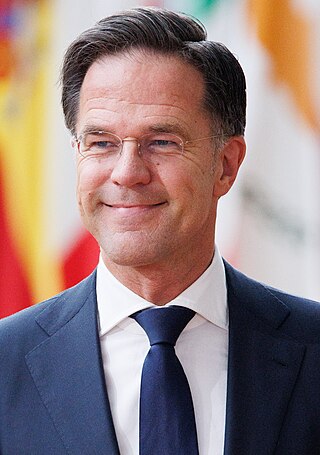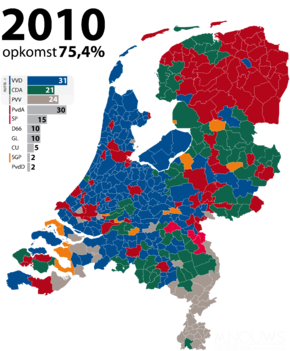
The People's Party for Freedom and Democracy is a conservative-liberal political party in the Netherlands. The VVD, whose forerunner was the Freedom Party, is a party of the centre-right, which promotes private enterprise and economic liberalism.
The Labour Party is a social-democratic political party in the Netherlands.

The politics of the Netherlands take place within the framework of a parliamentary representative democracy. A constitutional monarchy, the country is organised as a decentralised unitary state. The Netherlands can be described as a consociational state. Dutch politics and governance are characterised by a common striving for broad consensus on important issues, within both of the political community and society as a whole.

The Christian Democratic Appeal is a Christian-democratic and socially conservative political party in the Netherlands. It was originally formed in 1977 from a confederation of the Catholic People's Party, the Anti-Revolutionary Party and the Christian Historical Union; it has participated in all but three cabinets since it became a unitary party.

Democrats 66 is a social liberal political party in the Netherlands, which positions itself in the centre of the political spectrum. It is a member of the Liberal International (LI) and the Alliance of Liberals and Democrats for Europe (ALDE).

The second Balkenende cabinet was the executive branch of the Government of the Netherlands from 27 May 2003 until 7 July 2006. The cabinet was formed by the Christian-democratic Christian Democratic Appeal (CDA), the conservative-liberal People's Party for Freedom and Democracy (VVD), and the social-liberal Democrats 66 (D66) after the election of 2003. The cabinet was a centre-right coalition and had a slim majority in the House of Representatives with Christian Democratic Leader Jan Peter Balkenende serving as Prime Minister. Liberal Leader Gerrit Zalm, a former Minister of Finance, served as Deputy Prime Minister and returned as Minister of Finance, while former Progressive-Liberal Leader Thom de Graaf served as Deputy Prime Minister and Minister without Portfolio for the Interior.

General elections were held in the Netherlands on 22 January 2003.

General elections were held in the Netherlands on 22 November 2006, following the fall of the Second Balkenende cabinet. The election proved relatively successful for the governing Christian Democratic Appeal (CDA) which remained the largest party with 41 seats, a loss of only three seats. The largest increase in seats was for the Socialist Party (SP), which went from nine to 25 seats. The main opposition party, the social democratic Labour Party (PvdA) lost nine of its 42 seats, while the right-liberal People's Party for Freedom and Democracy (VVD) and the progressive liberal Democrats 66 lost a considerable portion of their seats, six of 28 and three of six, respectively. New parties, such as the right-wing Party for Freedom (PVV) of former VVD MP Geert Wilders and the animal rights party Party for the Animals (PvdD) were also successful, with the PVV winning nine seats and the PvdD winning two, thereby becoming the first animal rights group to enter a European parliament.

Mark Rutte is a Dutch politician who has served as prime minister of the Netherlands since 2010. He was also the leader of the People's Party for Freedom and Democracy (VVD) from 2006 through 2023. He is currently acting in a demissionary capacity, and will not return to politics following the installation of a new cabinet, after the 2023 Dutch general election.

Following the 2006 Dutch general election, held on November 22, a process of cabinet formation started, involving negotiations about which coalition partners to form a common programme of policy and to divide the posts in cabinet. On February 22, 2007 it resulted in the formation of the Fourth Balkenende cabinet.

The first Rutte cabinet, also called the Rutte–Verhagen cabinet was the executive branch of the Government of the Netherlands from 14 October 2010 until 5 November 2012. The cabinet was formed by the conservative-liberal People's Party for Freedom and Democracy (VVD) and the Christian-democratic Christian Democratic Appeal (CDA) after the election of 2010. The cabinet was a right-wing coalition and had a minority in the House of Representatives but had confidence and supply from the Party for Freedom (PVV) for a slim majority with Liberal Leader Mark Rutte serving as Prime Minister. Christian Democratic Leader Maxime Verhagen served as Deputy Prime Minister and Minister of Economic Affairs, Agriculture and Innovation.

Early general elections were held in the Netherlands on 12 September 2012 after Prime Minister Mark Rutte handed in his government's resignation to Queen Beatrix on 23 April. The 150 seats of the House of Representatives were contested using party-list proportional representation. The People's Party for Freedom and Democracy (VVD) received a plurality of the votes, followed by the Labour Party (PvdA).

General elections were held in the Netherlands on Wednesday 15 March 2017 to elect all 150 members of the House of Representatives.

Provincial elections were held in the Netherlands on Wednesday 18 March 2015. Eligible voters elected the members of the States-Provincial in the twelve provinces. These elections also indirectly determined the members of the Senate, since the 566 members of the twelve States-Provincial will elect the Senate's 75 members in the Senate election on 26 May 2015. These provincial election were held on the same day as the 2015 Dutch water boards elections.

General elections were held in the Netherlands from 15 to 17 March 2021 to elect all 150 members of the House of Representatives. Following the elections and lengthy coalition formation talks, the sitting government remained in power.

The third Rutte cabinet was the cabinet of the Netherlands from 26 October 2017 until 10 January 2022. It was formed by a coalition government of the political parties People's Party for Freedom and Democracy (VVD), Christian Democratic Appeal (CDA), Democrats 66 (D66) and Christian Union (CU) after the general election of 2017.

Early general elections were held in the Netherlands on 22 November 2023 to elect the members of the House of Representatives. The elections had been expected to be held in 2025 but a snap election was called after the fourth Rutte cabinet collapsed on 7 July 2023 due to immigration policy disagreements between the coalition parties. The incumbent prime minister Mark Rutte announced that he would not lead his party into the election and that he would retire from politics.

A process of cabinet formation took place following the 2021 Dutch general election, leading to the formation of the Fourth Rutte cabinet in 2022. The coalition consisted of People's Party for Freedom and Democracy (VVD), Democrats 66 (D66), Christian Democratic Appeal (CDA) and Christian Union (CU), the same parties that formed the preceding Third Rutte cabinet. At 299 days, it was the longest formation in Dutch history.
In the run-up to the 2023 Dutch general election, various organisations carried out opinion polling to gauge voting intentions in the Netherlands. Results of such polls are displayed in this list.
A process of cabinet formation is taking place following the Dutch general election of 22 November 2023.

















